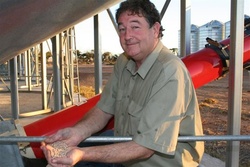
Mr Clarke has offered local advice to a Chinese delegation that’s looking to purchase WA farm-land in and around Lake King, Ongerup and Newdegate during recent visits
Landholder backs right to 'sell the farm'
BY COLIN BETTLES
LAKE Grace farmer Doug Clarke says foreign investment should be welcomed not feared and farmers should not be criticised for making a commercial return from selling their farms, if the government’s current rules and regulations allow it.
Mr Clarke has offered local advice to a Chinese delegation that’s looking to purchase WA farm-land in and around Lake King, Ongerup and Newdegate during recent visits.
He described the move as a pilot project, which will only advance further, if agreements are reached following due diligence.
Mr Clarke said he didn’t know exactly how much the Chinese investors had to spend or exactly how much land they were looking to buy.
He said the strategy was a means of addressing emerging food security concerns in China but Australia wasn’t the only investment target.
They are also looking at structuring similar investment joint ventures and buy farm land in Brazil, North Africa, South Africa, Argentina and even New Zealand.
He said the deal had the potential to bring mutual benefits through research and development and grain handling infrastructure at the Albany port.
Other organisations may be involved in a potential joint venture but Mr Clarke was reluctant to reveal more details.
That however, may see some resistance from WA bulk grain handler, CBH, which says it welcomes grain storage and handling competition and is prepared to meet any challenges on a commercial footing and quality control.
In the past two years, Mr Clarke has looked into developing a joint venture to introduce grain handling infrastructure at the Albany port, to induce competition against CBH and lower grain handling costs for growers in the region.
Ongoing speculation has suggested a wood chip loading facility at the port, could be easily converted to handle grain economically and safely.
Port infrastructure such as grain silos, would be considered expensive due to the location’s high rental costs.
But grain storage within striking distance of the port has been entertained as part of a preliminary feasibility study, involving a possible joint venture with shipping company, Patrick and a grain marketing and/or shipping company.
Mr Clarke has been reluctant to reveal precise details of the potential deal but has said previously that the concept has been looked into due to concerns with unacceptable storage and handling costs for growers.
Esperance and Geraldton growers have also looked into similar options at their ports, to also bypass CBH and take advantage of commercial opportunities stimulated by the deregulated bulk wheat export market, following demise of the AWB monopoly in 2008.
The Chinese delegation have spoken to several farmers and travelled with local real estate agents on recent visits, including last month.
Mr Clarke said the Chinese “due diligence” saw them conducting soil testing and looking into other aspects of the potential arrangement such as land values.
After speaking to media about the Chinese delegation’s plans last week, Mr Clarke said several farmers had called him and expressed an interest in selling property and learning more about the situation.
“I don’t see it as a threat at all; farmers are entitled to sell their land if they want to and it’s just another option,” he said.
“We had our worst year in 100 years last year so if there’s another buyer in the market, putting a floor in the market, that’s just like selling our wheat and can only be a good thing.
“It’s not in breach of foreign investment rules so what’s the drama?”
Mr Clarke said it was “not a done deal by any means” with the Chinese investors having only held preliminary discussions with farmers and on the logistics potential, “just discussing options”.
He believes there are “great benefits” attached to the potential deal, building on a strong history of foreign investment working successfully within Australian agriculture; a sentiment echoed by the government, Federal opposition and the National Farmers Federation.
He said countries that “closed their borders” to foreign agricultural investment, like North Korea, had shown they were more inclined to fail.
“They can’t take the farms back to China,” he said.
“Foreign investment works in the mining sector in the north west, where companies contribute to rail and port infrastructure.
“What’s the difference with this and other infrastructure in Australia?
“They will start off with a pilot program and if it doesn’t work then they will sell the land back and it will all return to normal.”
Mr Clarke said farmers should not be criticised for getting a good price for their land and if Foreign Investment Review Board rules needed changing, then that’s where energy should be directed.
He said the Chinese government and companies should not be knocked for having a positive attitude towards agriculture and a vision for feeding the nation while in Australia, “we lurch from one election to the next”.













